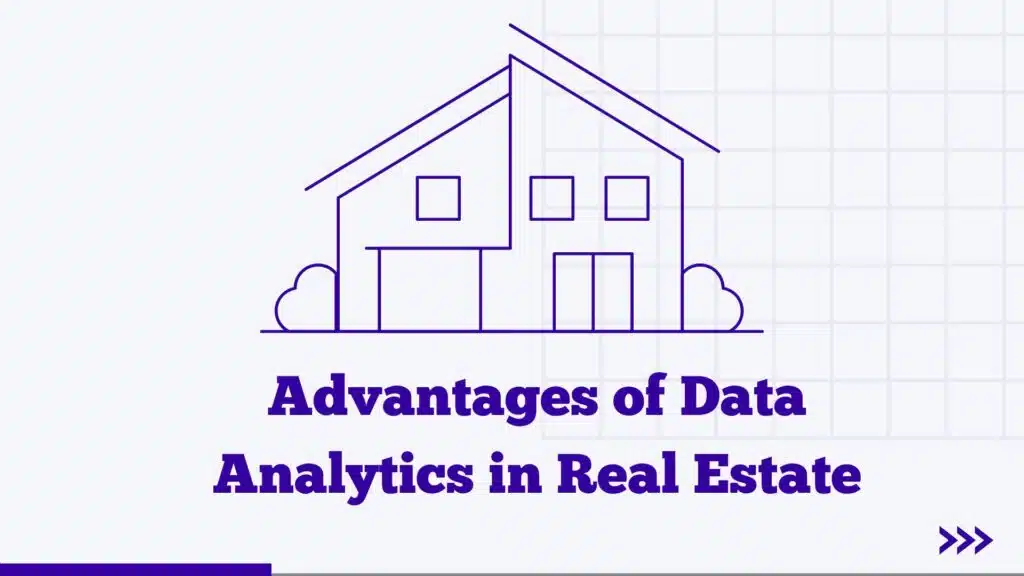
Real estate is one of the most competitive industries in the world, which is why data analytics for real estate is becoming popular among top-selling brokers. Real Estate Data Analytics Real estate brokers based on data, insights about market trends, buyer behaviour, mobility trends, property values, etc. Thanks to todays technology most of real estate brokers fully depend on Real estate data and insights of the market.
5 Key Advantages of Data Analytics in Real Estate
Real estate industry was an art in the good old days, when it came to buying and selling of real estate. Historically, brokers have essentially used their gut and some simple, backwards looking data to guide their decisions for over forty years. Times have changed, and to survive today and compete effectively in the future, brokers must finally acknowledge that while real estate is still an art, it is also a science…one that demands the use of real estate data analytics to make intelligent decisions.
At its most simplified, real estate data analytics refers to data (data collection), the analysis of data (data analytics) and linking this data with the key business items such as: Real property valuation Studies to identify the latest trends in the market. They could be much better equipped at predicting future states of the market from present and past patterns and relations, which could profit their clients.
Data analytics is an intimidating term, but big data is not a neccessary component. We figured 5 important advantages of big data in real estate that everyone with an internet connection and some motivation can gain.

1. More accurate prediction of real estate values
One of the biggest secrets when it comes to the buying and selling of real estate is getting a good price by both parties involved. Sellers rely on their broker to sell their property for the highest price possible and as quickly as possible.
A poor price will make it difficult, if not impossible, to stem the interest from potential buyers after they skipped right past your property during the initial spike in interest. Reducing the price often follows diminishing showings. But most buyers will still try to negotiate a reduced price from the reduced price, often resulting in a lower selling price than if the listing had simply been accurately priced to begin with.
The good news is that brokers have a wealth of comparable data available, setting a realistic list price relative to past sales prices for properties of the same age and condition with features, accessibility, etc.
2. More efficient marketing
Of all the new marketing buzzwords that have come and gone over the last few years, personalization might just be the most I have heard across the board. One reason is largely due to increased data availability, allowing marketers to create laser-focused customer segments and send the right product and/or service to them at consumers when they need it, in some cases before they even knew they needed it.
Here are 5 highly effective real estate lead generation strategies top brokers are using. They may even be using real estate data analytics for personalized marketing by sifting through their book of business and creating a list of previous customers who have expressed a preference for a particular type of home. With this information, they can also create personas to better target suitable buyers for current and future listings.
The part paid social media advertising has to now play in driving real estate sales is now relevant than ever yesterday and knowing things like the likes, needs, financial standing and geographic history of someone who has purchased a similar place makes it so much easier t to target the right audience.
This is also a very good strategy in order to get new listings. These data pointers which include whether mortgage equity has been claimed on their homes or how long a property owner has been in one place would help identify these prospective sellers when compared to past sellers.
Besides, understanding what the key aspects are as to why previous properties have sold, can be helpful in lead generation and in developing strong case stories as to why prospects should pick one broker over the competition.

3. Understanding market trends more accurately
The top brokers tend to be true masters of analyzing any and all factors that impact a property and likely investment. They succeed because the know the business in-and-out, and that is the reputation they built it on. Similar to most industries, real estate in recent years has been progressively more complex, and competitive.
Yet, what held true in the market three months ago, may not hold true now. Being aware of the market in the element of the cycle we are in right now and considering the other factors that determine that matter, interest rates for example, should enable the brokers to be in a more competent position to advise their prospects and clients when it comes to buying and selling real estate.
4. Informed about competitors’ activities
Real estate is a game of getting the right buyers and sellers to the broker and getting sellers to choose your brokerage over the competition. So, just as with most other industries, it is useful to keep an eye on what the competitors in the market are up to.
Data analytics for real estate allow brokers to see which are the most or least successful companies/brokers in their area, which are the most listed and sold, where they rank for customer satisfaction and more. Data like this, coupled with detailed competitor marketing insight, can give brokers the edge they need — learning directly from their playbooks, and building upon them.

5. Faster business growth
To see your business grow, use real estate data analytics strategically and continuously. Using real estate data analytics strategically and on an ongoing basis should grow your business. This pricing will lead to higher sales, satisfied customers and higher revenue with the approach being market driven and the marketing being more targeted. Which means, brokers that either make the decision to understand the keys to selling more efficiently with a data analytics culture become the best brokers.
To get the most out of data, visualize it!
Real estate data analytics clearly has the potential to both enhance performance and raise profits for all investors but remember, data is only as helpful as the actions you take with it. The unnecessary complexity of data analytics is, in fact, the biggest barrier to regular, successful use of it by any broker, no matter how well-intentioned they may be.
As a way to overcome this hurdle, a lot of the very best brokers have implemented their data into various real-time dashboards and reports. The good news with the data revolution was that we saw a plethora of visualization tools come to market.
This allows you to set and save reports, taking ugly data and making dynamic, easy-to-understand graphics (that you might be more likely to use). Some solutions will have automated reporting tools so that your information is consistently up-to-date, ready to export to PowerPoint or Excel for presentation in just a couple of clicks.
Dashboard – Another great visualization tool that allows you to take easy-to-understand and much-needed datasets and transform it into a basic visual format that’s more engaging. Dashboards allow you to view how you’re performing against your KPIs regarding your activities, pipeline, leads, and more If you are a broker, this visual tracking of appointments booked, offers made, contracts signed, projections of sales and commission won, will motivate and remind you of your achievements for the month.






